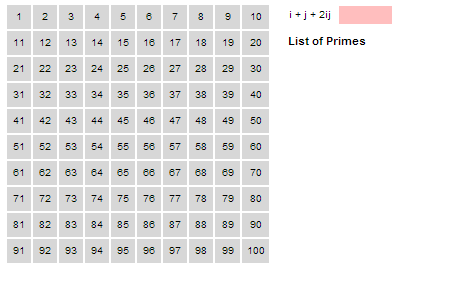13
1
The Challenge
Implement the Sundaram sieve for finding prime numbers below n. Take an input integer, n, and output the prime numbers below n. You can assume that n will always be less than or equal to one million.
Sieve
Start with a list of the integers from
1ton.Remove all numbers that are in the form
i + j + 2ijwhere:iandjare less thann.jis always greater than or equal toi, which is greater than or equal to1.
i + j + 2ijis less than or equal ton
Multiply the remaining numbers by
2, and add1.
This will yield all the prime numbers (except 2, which should be included in your output) less than 2n + 2.
Here is an animation of the sieve being used to find primes below 202.

Output
Your output should be every prime integer ≤ n (in ascending order) followed by a newline:
2
3
5
Where n is 5.
Examples
> 10
2
3
5
7
> 30
2
3
5
7
11
13
17
19
23
29
Inputs are denoted by >.
Your example with
n=30is missing 29 in the output. – isaacg – 2015-09-30T18:57:34.8735A trouble with challenges that ask to use a specific method is that it's not clear what modifications one can make. For example, your description checks only
(i,j)withi<=j, but the result doesn't change if we ignore this requirement. Can we do so to save bytes? – xnor – 2015-09-30T19:25:23.233I never said that you had to check if
i <= j. It's just part of how the sieve works. So yes, you can leave out thei <= jin your code. @xnor – Zach Gates – 2015-09-30T19:37:54.2202How much leeway do we have here? The sieve is equivalent to selecting all odd numbers (because the results are of the form
2n+1) which are not of the form2(i + j + 2ij)+1- can we test this property directly on the potential primes or does our code have to do the times 2 plus 1 at some point? – Martin Ender – 2015-09-30T20:22:04.977You must multiply the filtered results by two and add one. @MartinBüttner – Zach Gates – 2015-09-30T20:27:59.837
Nice challenge! I haven't heard of this method before. I got confused at "except two", as I thought it meant there were two primes not included. Perhaps you should just change it to "except
2" or something similar. Also, I believe you forgot the5in the first example (wherenis5), unless this was intentional. – ETHproductions – 2015-09-30T21:07:29.080Thanks for the suggestion! I've also fixed the example. @ETHproductions – Zach Gates – 2015-09-30T21:36:50.173
imust be >1,jmust be >i, so the sieve starts with i=2,j=3 and the first eliminated number isi + j + 2ij -> 2 + 3 + 2*2*3 = 17. How is the example eliminating 4,7,10,12,13,15...? – TessellatingHeckler – 2015-10-01T02:20:02.2501I'm a little confused by what
nis in the whole thing. In the method description, it says that it will generate all primes up to2 * n + 2. But in the input/output description, it says that the input isn, and the output all primes up ton. So are we supposed to apply the method to generate all primes up to2 * n + 2, and then drop the ones larger thannfor the output? Or should we calculate thenin the method description from the inputn? – Reto Koradi – 2015-10-01T03:56:01.300You should calculate and then drop the ones larger than
n. @RetoKoradi – Zach Gates – 2015-10-01T04:00:17.513There's a difference between text and formula. In the text, it says "j is always greater than i, which is greater than 1". In the formula, it shows
>=for both of these, not>. – Reto Koradi – 2015-10-01T05:23:44.060I've fixed it. @RetoKoradi – Zach Gates – 2015-10-01T05:26:58.583
I assume it is legit to take n >= 2 as granted (considering it doesnt make sense to look for primes smaller than 2) as all of the solutions dont consider that case? – enpenax – 2015-10-01T11:09:03.743
Does the initial array have to start with 1, or can it start with 0 to simplify indexing? Do all of the calculations have to be done in that order, or can you pre-calculate the
2n + 2values? – Brad Gilbert b2gills – 2015-11-30T00:31:39.273